Brexit's Impact on UK Economy
VerifiedAdded on 2021/04/21
|13
|2273
|29
AI Summary
The assignment discusses the potential consequences of Brexit on the UK economy, including a decline in investment, reduced research in new drugs, and a possible contraction of syndicated lending. It also touches on the long-run effects of Brexit on the UK economy, including productivity growth and export expansion.
Contribute Materials
Your contribution can guide someone’s learning journey. Share your
documents today.
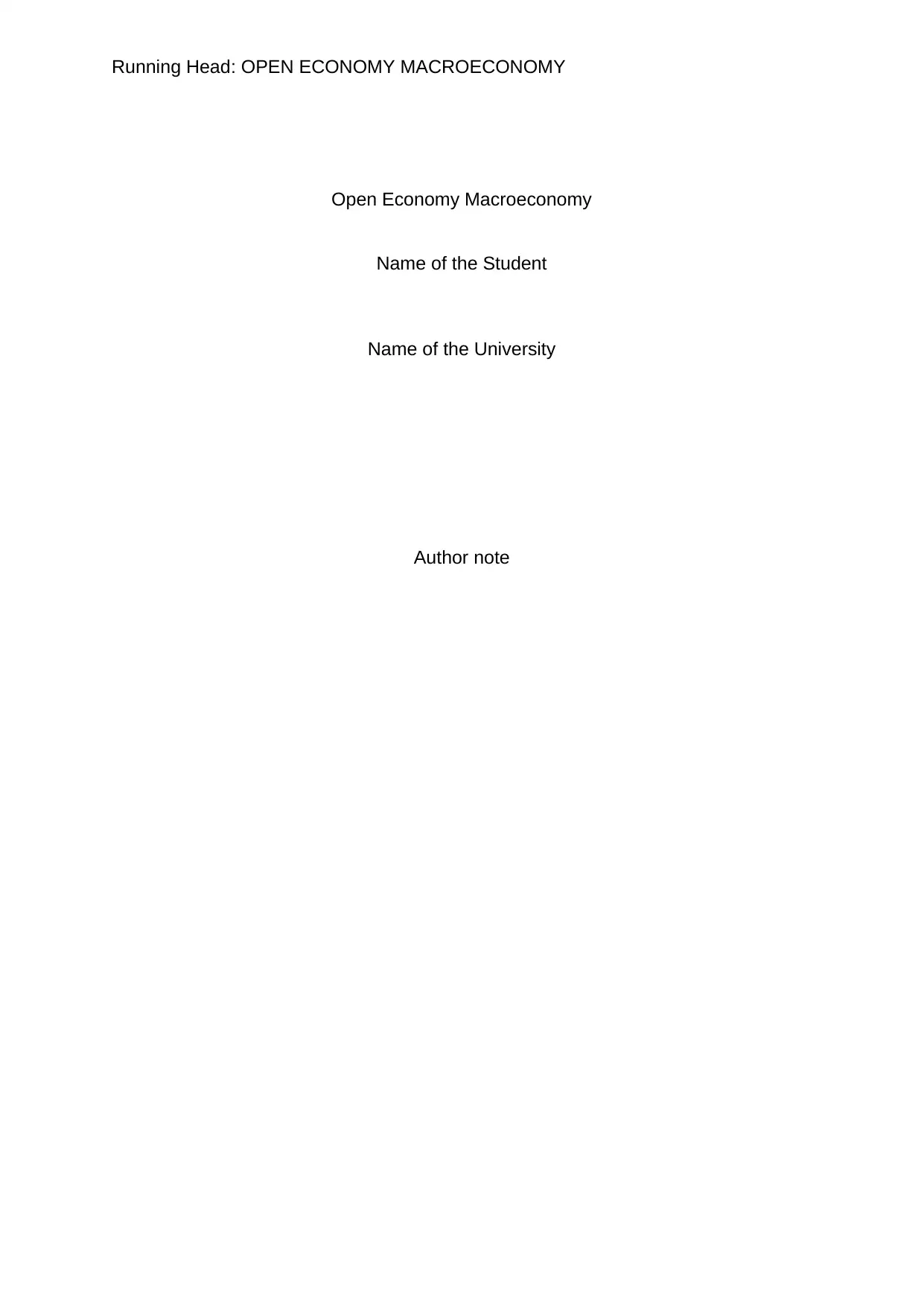
Running Head: OPEN ECONOMY MACROECONOMY
Open Economy Macroeconomy
Name of the Student
Name of the University
Author note
Open Economy Macroeconomy
Name of the Student
Name of the University
Author note
Secure Best Marks with AI Grader
Need help grading? Try our AI Grader for instant feedback on your assignments.
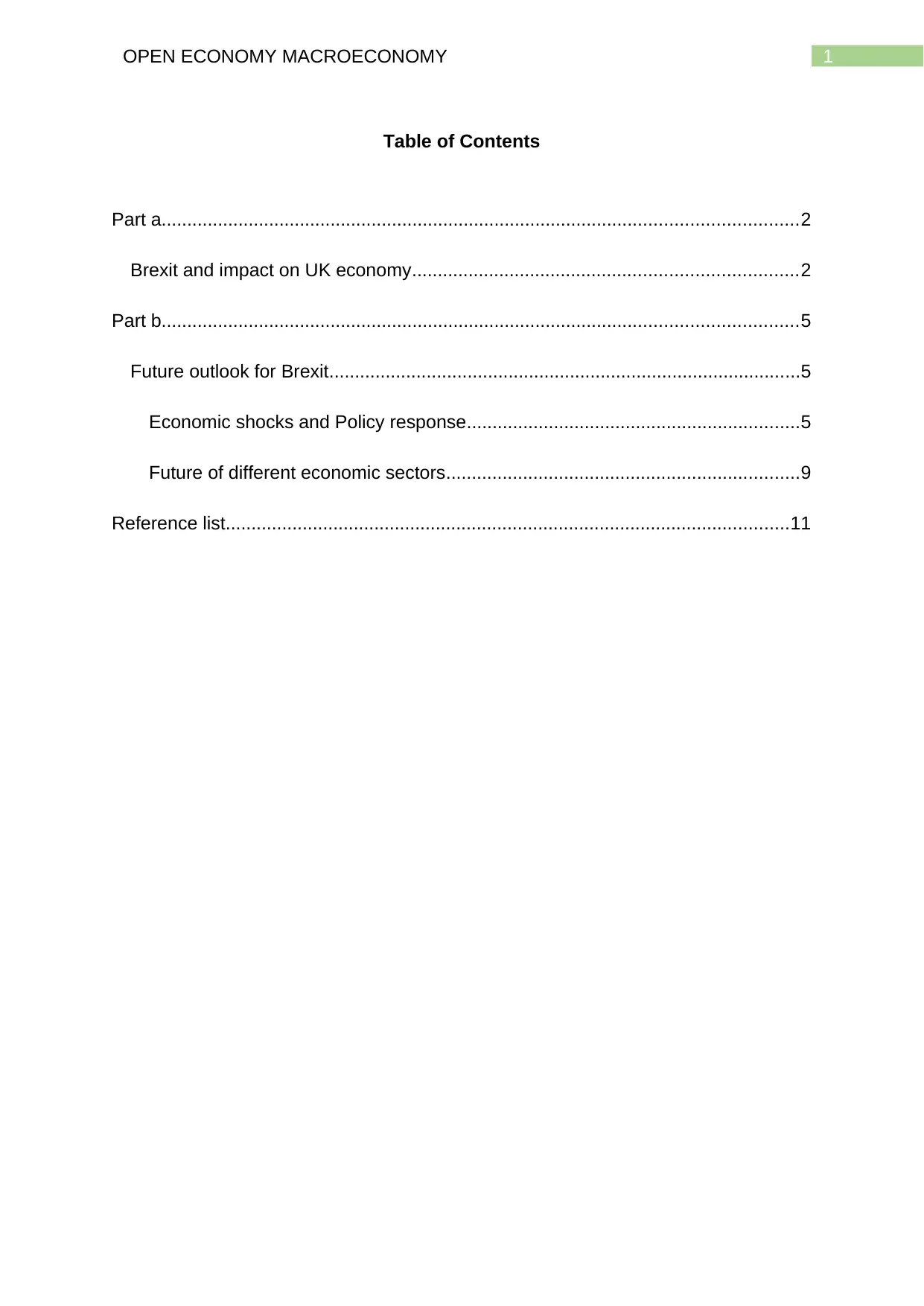
1OPEN ECONOMY MACROECONOMY
Table of Contents
Part a............................................................................................................................2
Brexit and impact on UK economy...........................................................................2
Part b............................................................................................................................5
Future outlook for Brexit............................................................................................5
Economic shocks and Policy response.................................................................5
Future of different economic sectors.....................................................................9
Reference list..............................................................................................................11
Table of Contents
Part a............................................................................................................................2
Brexit and impact on UK economy...........................................................................2
Part b............................................................................................................................5
Future outlook for Brexit............................................................................................5
Economic shocks and Policy response.................................................................5
Future of different economic sectors.....................................................................9
Reference list..............................................................................................................11
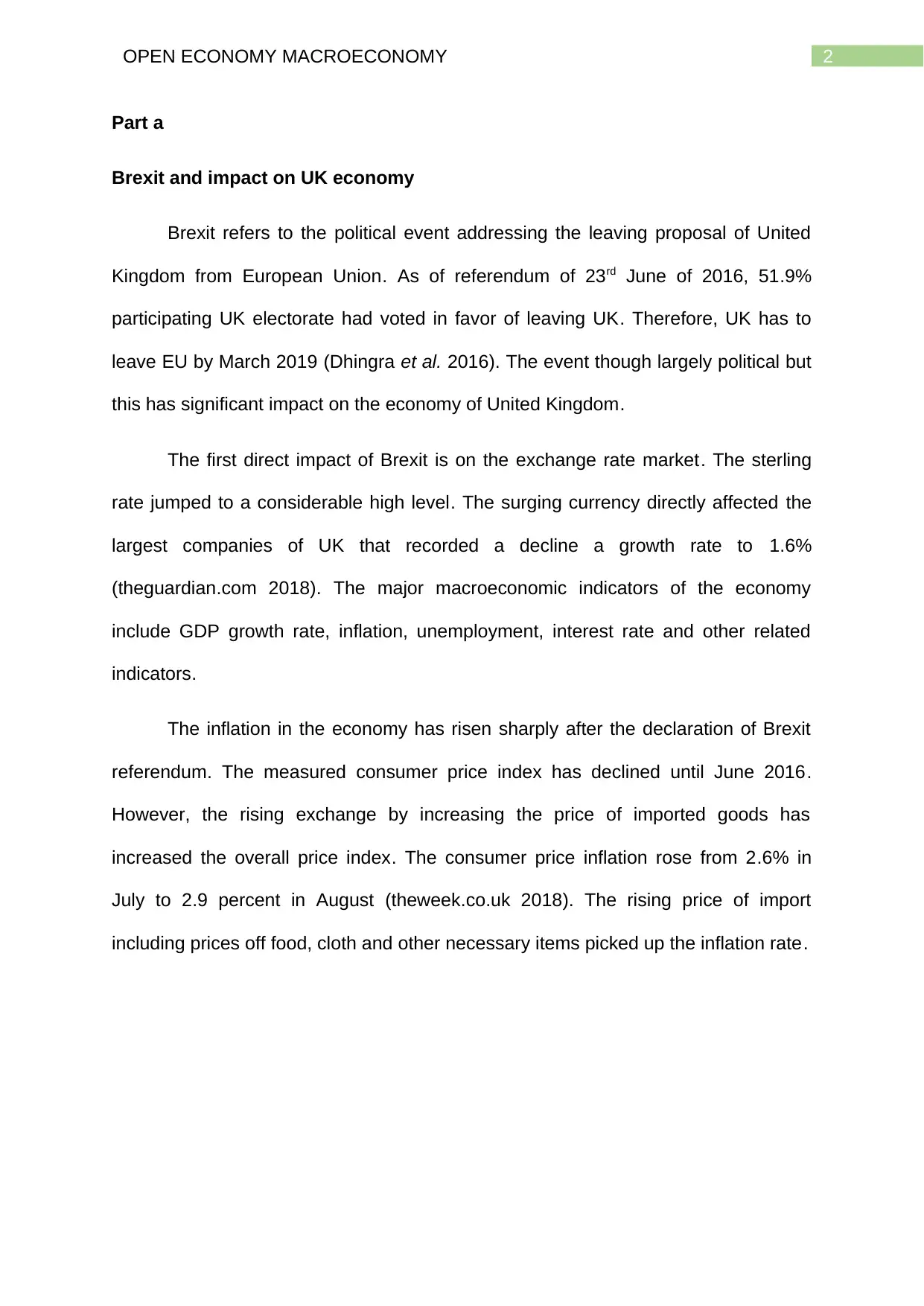
2OPEN ECONOMY MACROECONOMY
Part a
Brexit and impact on UK economy
Brexit refers to the political event addressing the leaving proposal of United
Kingdom from European Union. As of referendum of 23rd June of 2016, 51.9%
participating UK electorate had voted in favor of leaving UK. Therefore, UK has to
leave EU by March 2019 (Dhingra et al. 2016). The event though largely political but
this has significant impact on the economy of United Kingdom.
The first direct impact of Brexit is on the exchange rate market. The sterling
rate jumped to a considerable high level. The surging currency directly affected the
largest companies of UK that recorded a decline a growth rate to 1.6%
(theguardian.com 2018). The major macroeconomic indicators of the economy
include GDP growth rate, inflation, unemployment, interest rate and other related
indicators.
The inflation in the economy has risen sharply after the declaration of Brexit
referendum. The measured consumer price index has declined until June 2016.
However, the rising exchange by increasing the price of imported goods has
increased the overall price index. The consumer price inflation rose from 2.6% in
July to 2.9 percent in August (theweek.co.uk 2018). The rising price of import
including prices off food, cloth and other necessary items picked up the inflation rate.
Part a
Brexit and impact on UK economy
Brexit refers to the political event addressing the leaving proposal of United
Kingdom from European Union. As of referendum of 23rd June of 2016, 51.9%
participating UK electorate had voted in favor of leaving UK. Therefore, UK has to
leave EU by March 2019 (Dhingra et al. 2016). The event though largely political but
this has significant impact on the economy of United Kingdom.
The first direct impact of Brexit is on the exchange rate market. The sterling
rate jumped to a considerable high level. The surging currency directly affected the
largest companies of UK that recorded a decline a growth rate to 1.6%
(theguardian.com 2018). The major macroeconomic indicators of the economy
include GDP growth rate, inflation, unemployment, interest rate and other related
indicators.
The inflation in the economy has risen sharply after the declaration of Brexit
referendum. The measured consumer price index has declined until June 2016.
However, the rising exchange by increasing the price of imported goods has
increased the overall price index. The consumer price inflation rose from 2.6% in
July to 2.9 percent in August (theweek.co.uk 2018). The rising price of import
including prices off food, cloth and other necessary items picked up the inflation rate.
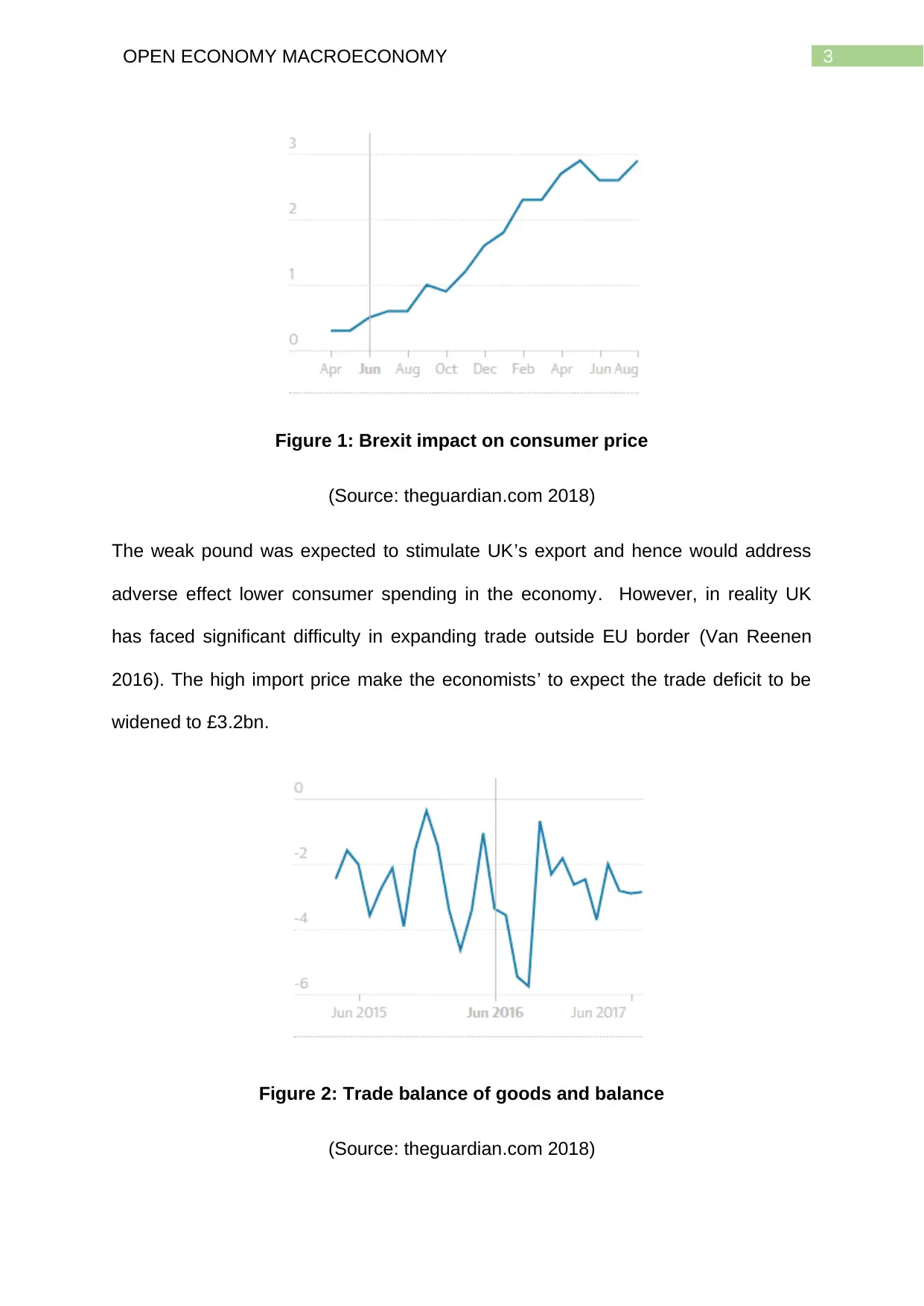
3OPEN ECONOMY MACROECONOMY
Figure 1: Brexit impact on consumer price
(Source: theguardian.com 2018)
The weak pound was expected to stimulate UK’s export and hence would address
adverse effect lower consumer spending in the economy. However, in reality UK
has faced significant difficulty in expanding trade outside EU border (Van Reenen
2016). The high import price make the economists’ to expect the trade deficit to be
widened to £3.2bn.
Figure 2: Trade balance of goods and balance
(Source: theguardian.com 2018)
Figure 1: Brexit impact on consumer price
(Source: theguardian.com 2018)
The weak pound was expected to stimulate UK’s export and hence would address
adverse effect lower consumer spending in the economy. However, in reality UK
has faced significant difficulty in expanding trade outside EU border (Van Reenen
2016). The high import price make the economists’ to expect the trade deficit to be
widened to £3.2bn.
Figure 2: Trade balance of goods and balance
(Source: theguardian.com 2018)
Secure Best Marks with AI Grader
Need help grading? Try our AI Grader for instant feedback on your assignments.
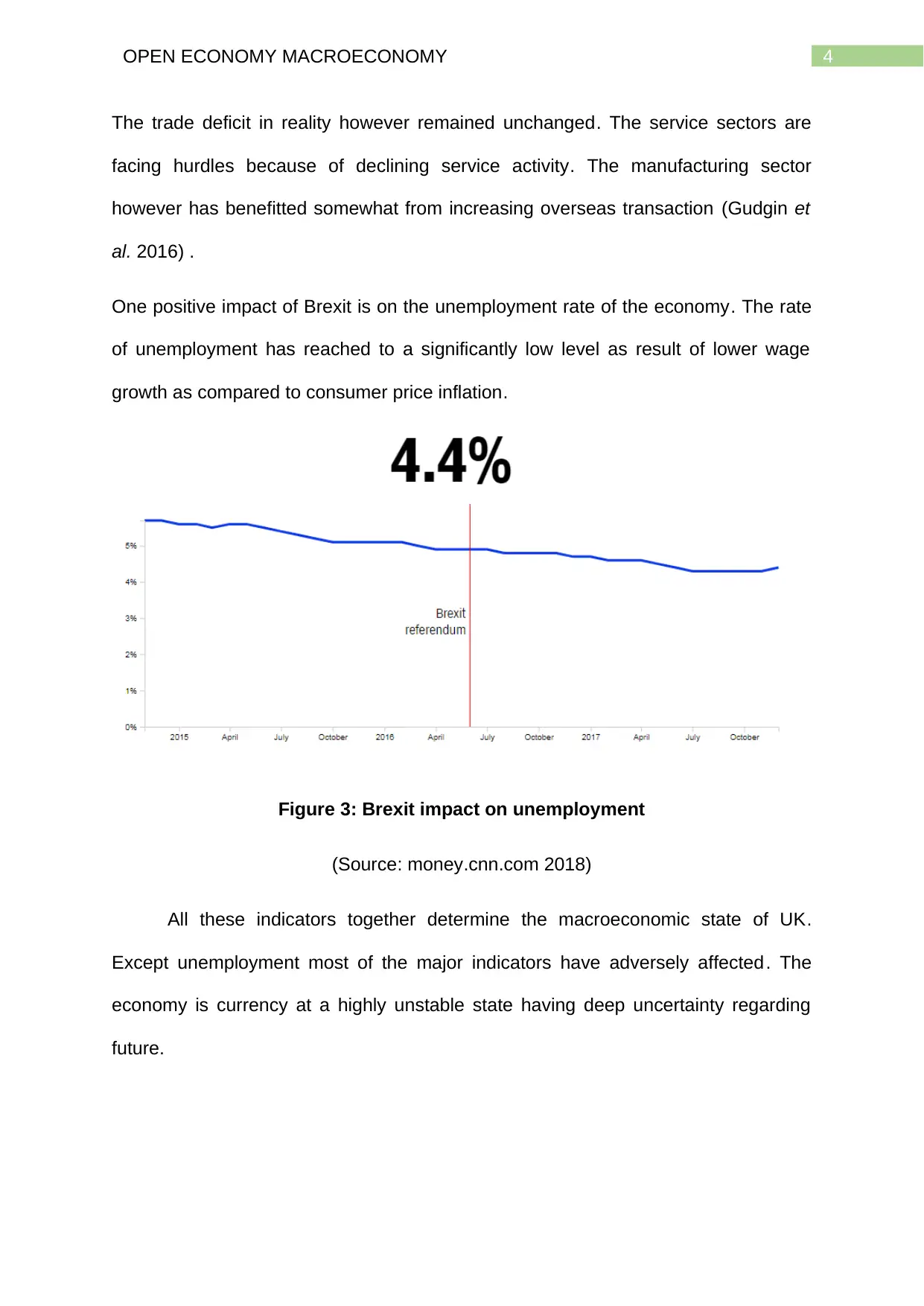
4OPEN ECONOMY MACROECONOMY
The trade deficit in reality however remained unchanged. The service sectors are
facing hurdles because of declining service activity. The manufacturing sector
however has benefitted somewhat from increasing overseas transaction (Gudgin et
al. 2016) .
One positive impact of Brexit is on the unemployment rate of the economy. The rate
of unemployment has reached to a significantly low level as result of lower wage
growth as compared to consumer price inflation.
Figure 3: Brexit impact on unemployment
(Source: money.cnn.com 2018)
All these indicators together determine the macroeconomic state of UK.
Except unemployment most of the major indicators have adversely affected. The
economy is currency at a highly unstable state having deep uncertainty regarding
future.
The trade deficit in reality however remained unchanged. The service sectors are
facing hurdles because of declining service activity. The manufacturing sector
however has benefitted somewhat from increasing overseas transaction (Gudgin et
al. 2016) .
One positive impact of Brexit is on the unemployment rate of the economy. The rate
of unemployment has reached to a significantly low level as result of lower wage
growth as compared to consumer price inflation.
Figure 3: Brexit impact on unemployment
(Source: money.cnn.com 2018)
All these indicators together determine the macroeconomic state of UK.
Except unemployment most of the major indicators have adversely affected. The
economy is currency at a highly unstable state having deep uncertainty regarding
future.
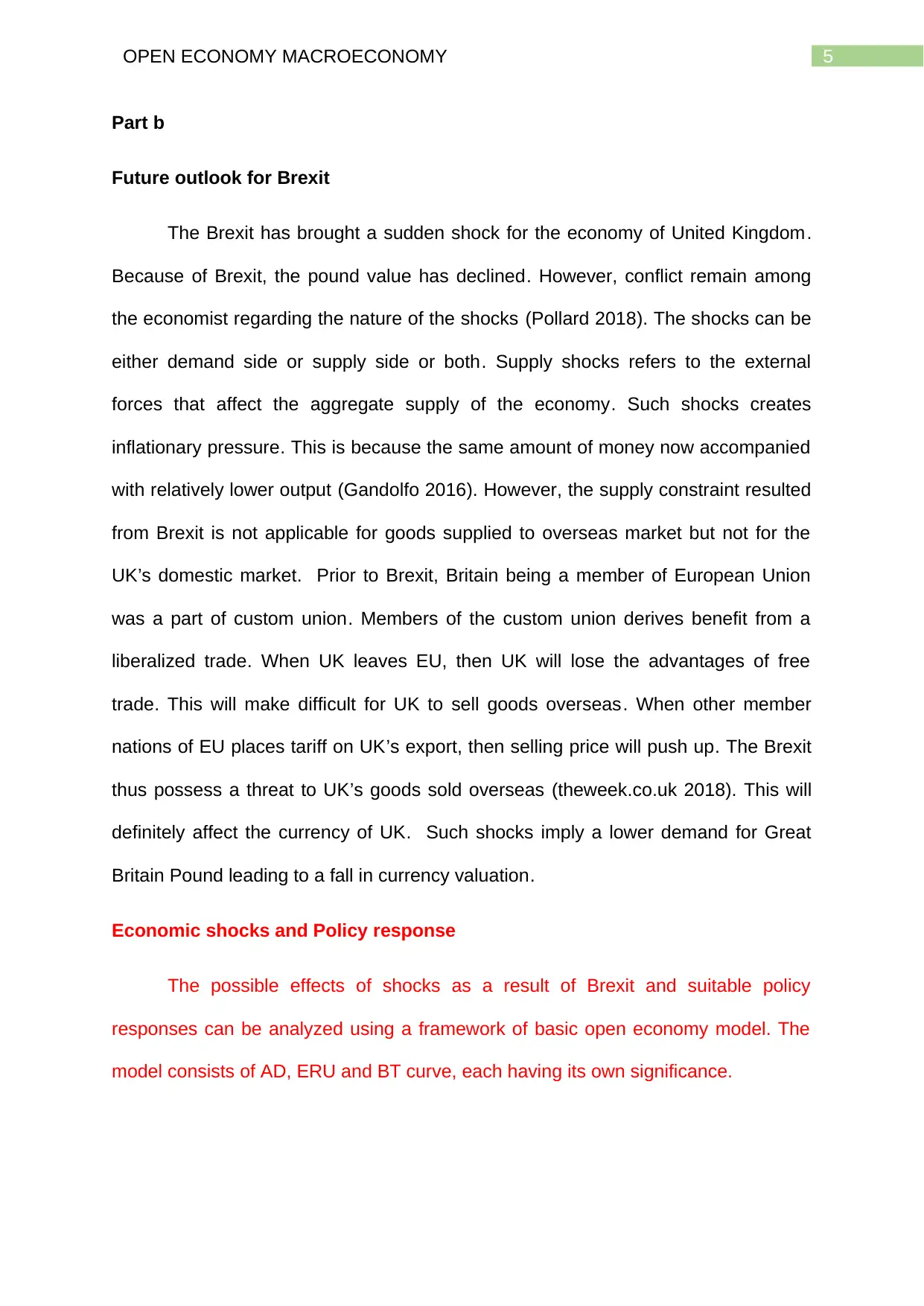
5OPEN ECONOMY MACROECONOMY
Part b
Future outlook for Brexit
The Brexit has brought a sudden shock for the economy of United Kingdom.
Because of Brexit, the pound value has declined. However, conflict remain among
the economist regarding the nature of the shocks (Pollard 2018). The shocks can be
either demand side or supply side or both. Supply shocks refers to the external
forces that affect the aggregate supply of the economy. Such shocks creates
inflationary pressure. This is because the same amount of money now accompanied
with relatively lower output (Gandolfo 2016). However, the supply constraint resulted
from Brexit is not applicable for goods supplied to overseas market but not for the
UK’s domestic market. Prior to Brexit, Britain being a member of European Union
was a part of custom union. Members of the custom union derives benefit from a
liberalized trade. When UK leaves EU, then UK will lose the advantages of free
trade. This will make difficult for UK to sell goods overseas. When other member
nations of EU places tariff on UK’s export, then selling price will push up. The Brexit
thus possess a threat to UK’s goods sold overseas (theweek.co.uk 2018). This will
definitely affect the currency of UK. Such shocks imply a lower demand for Great
Britain Pound leading to a fall in currency valuation.
Economic shocks and Policy response
The possible effects of shocks as a result of Brexit and suitable policy
responses can be analyzed using a framework of basic open economy model. The
model consists of AD, ERU and BT curve, each having its own significance.
Part b
Future outlook for Brexit
The Brexit has brought a sudden shock for the economy of United Kingdom.
Because of Brexit, the pound value has declined. However, conflict remain among
the economist regarding the nature of the shocks (Pollard 2018). The shocks can be
either demand side or supply side or both. Supply shocks refers to the external
forces that affect the aggregate supply of the economy. Such shocks creates
inflationary pressure. This is because the same amount of money now accompanied
with relatively lower output (Gandolfo 2016). However, the supply constraint resulted
from Brexit is not applicable for goods supplied to overseas market but not for the
UK’s domestic market. Prior to Brexit, Britain being a member of European Union
was a part of custom union. Members of the custom union derives benefit from a
liberalized trade. When UK leaves EU, then UK will lose the advantages of free
trade. This will make difficult for UK to sell goods overseas. When other member
nations of EU places tariff on UK’s export, then selling price will push up. The Brexit
thus possess a threat to UK’s goods sold overseas (theweek.co.uk 2018). This will
definitely affect the currency of UK. Such shocks imply a lower demand for Great
Britain Pound leading to a fall in currency valuation.
Economic shocks and Policy response
The possible effects of shocks as a result of Brexit and suitable policy
responses can be analyzed using a framework of basic open economy model. The
model consists of AD, ERU and BT curve, each having its own significance.
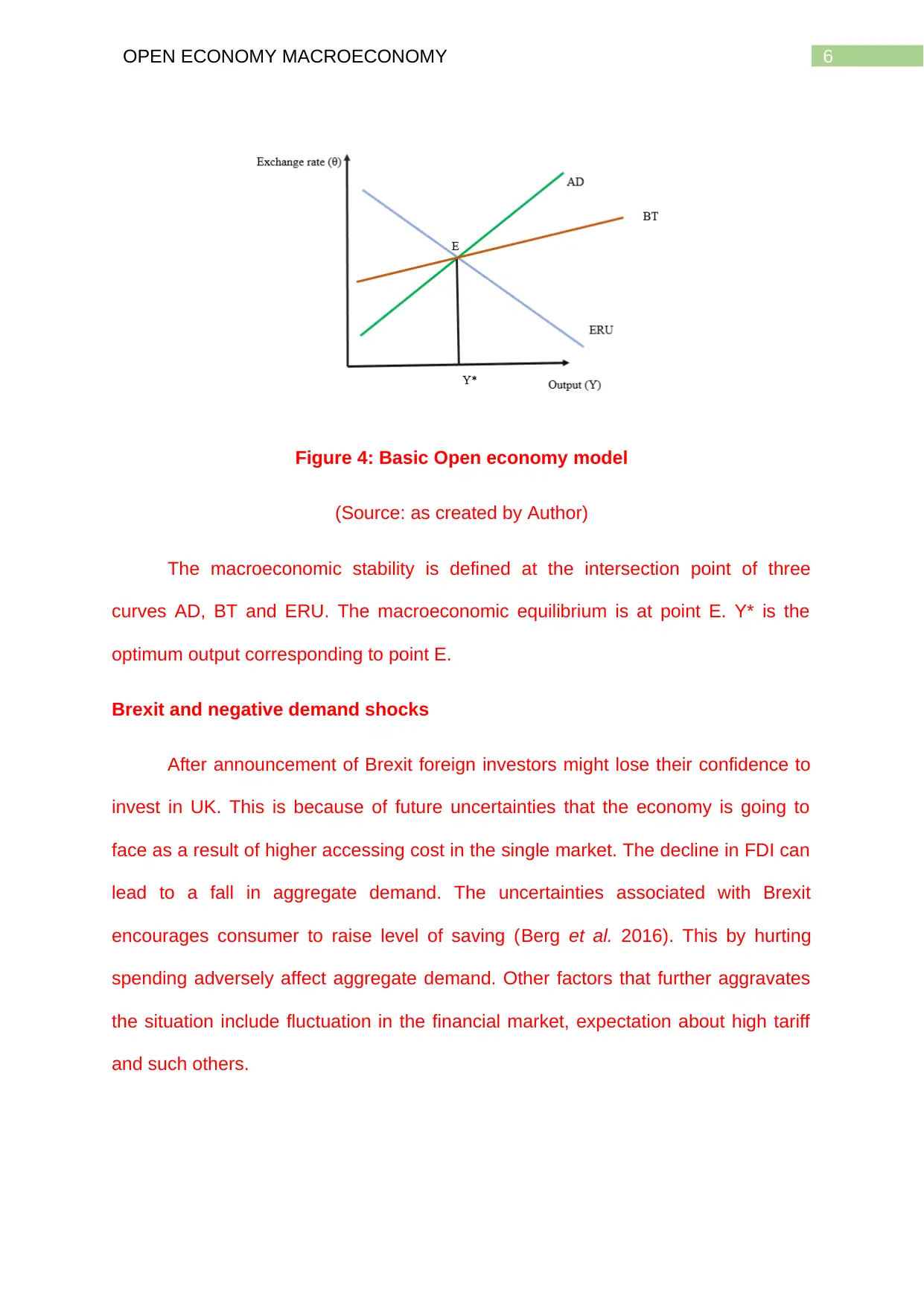
6OPEN ECONOMY MACROECONOMY
Figure 4: Basic Open economy model
(Source: as created by Author)
The macroeconomic stability is defined at the intersection point of three
curves AD, BT and ERU. The macroeconomic equilibrium is at point E. Y* is the
optimum output corresponding to point E.
Brexit and negative demand shocks
After announcement of Brexit foreign investors might lose their confidence to
invest in UK. This is because of future uncertainties that the economy is going to
face as a result of higher accessing cost in the single market. The decline in FDI can
lead to a fall in aggregate demand. The uncertainties associated with Brexit
encourages consumer to raise level of saving (Berg et al. 2016). This by hurting
spending adversely affect aggregate demand. Other factors that further aggravates
the situation include fluctuation in the financial market, expectation about high tariff
and such others.
Figure 4: Basic Open economy model
(Source: as created by Author)
The macroeconomic stability is defined at the intersection point of three
curves AD, BT and ERU. The macroeconomic equilibrium is at point E. Y* is the
optimum output corresponding to point E.
Brexit and negative demand shocks
After announcement of Brexit foreign investors might lose their confidence to
invest in UK. This is because of future uncertainties that the economy is going to
face as a result of higher accessing cost in the single market. The decline in FDI can
lead to a fall in aggregate demand. The uncertainties associated with Brexit
encourages consumer to raise level of saving (Berg et al. 2016). This by hurting
spending adversely affect aggregate demand. Other factors that further aggravates
the situation include fluctuation in the financial market, expectation about high tariff
and such others.
Paraphrase This Document
Need a fresh take? Get an instant paraphrase of this document with our AI Paraphraser
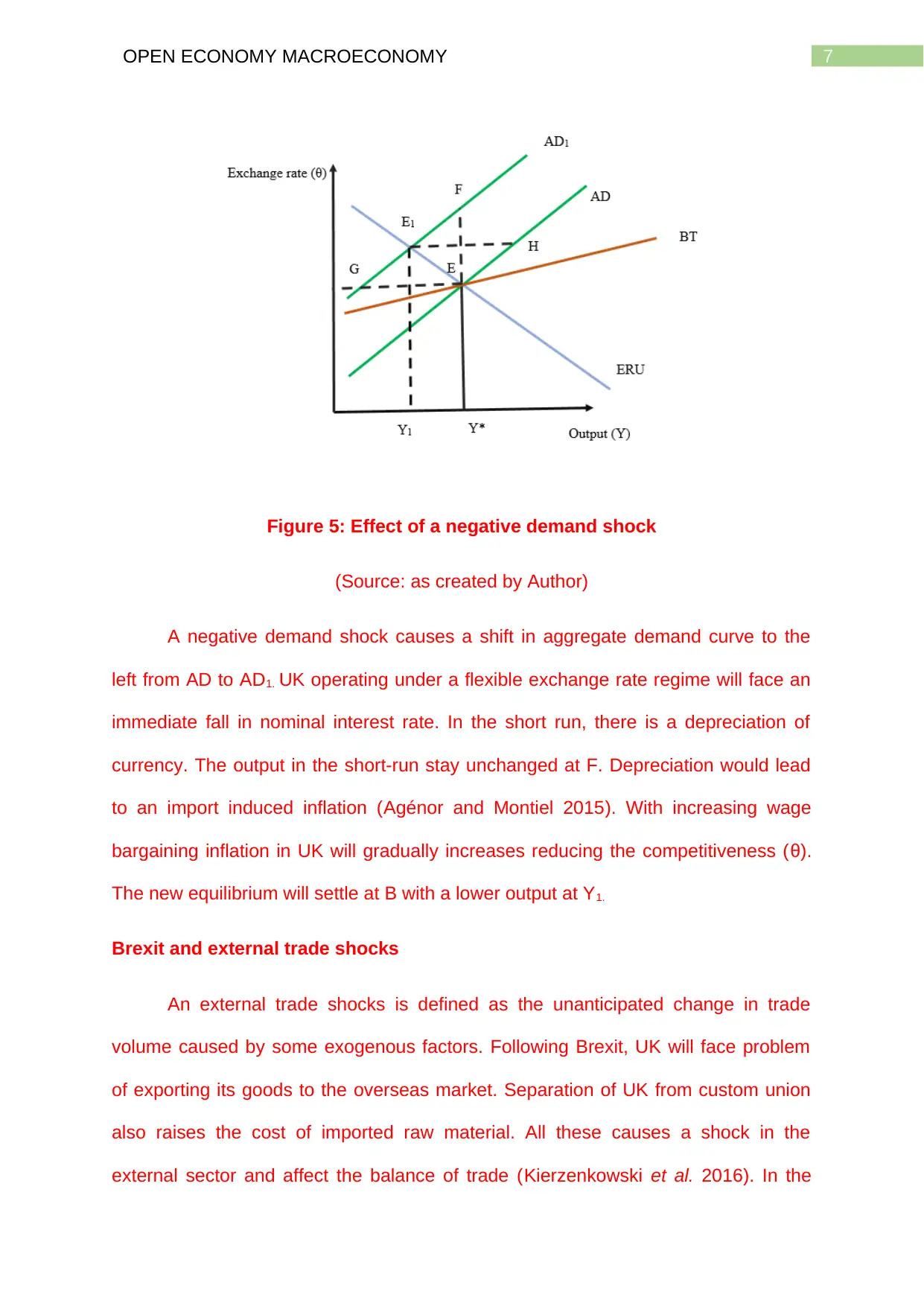
7OPEN ECONOMY MACROECONOMY
Figure 5: Effect of a negative demand shock
(Source: as created by Author)
A negative demand shock causes a shift in aggregate demand curve to the
left from AD to AD1. UK operating under a flexible exchange rate regime will face an
immediate fall in nominal interest rate. In the short run, there is a depreciation of
currency. The output in the short-run stay unchanged at F. Depreciation would lead
to an import induced inflation (Agénor and Montiel 2015). With increasing wage
bargaining inflation in UK will gradually increases reducing the competitiveness (θ).
The new equilibrium will settle at B with a lower output at Y1.
Brexit and external trade shocks
An external trade shocks is defined as the unanticipated change in trade
volume caused by some exogenous factors. Following Brexit, UK will face problem
of exporting its goods to the overseas market. Separation of UK from custom union
also raises the cost of imported raw material. All these causes a shock in the
external sector and affect the balance of trade (Kierzenkowski et al. 2016). In the
Figure 5: Effect of a negative demand shock
(Source: as created by Author)
A negative demand shock causes a shift in aggregate demand curve to the
left from AD to AD1. UK operating under a flexible exchange rate regime will face an
immediate fall in nominal interest rate. In the short run, there is a depreciation of
currency. The output in the short-run stay unchanged at F. Depreciation would lead
to an import induced inflation (Agénor and Montiel 2015). With increasing wage
bargaining inflation in UK will gradually increases reducing the competitiveness (θ).
The new equilibrium will settle at B with a lower output at Y1.
Brexit and external trade shocks
An external trade shocks is defined as the unanticipated change in trade
volume caused by some exogenous factors. Following Brexit, UK will face problem
of exporting its goods to the overseas market. Separation of UK from custom union
also raises the cost of imported raw material. All these causes a shock in the
external sector and affect the balance of trade (Kierzenkowski et al. 2016). In the
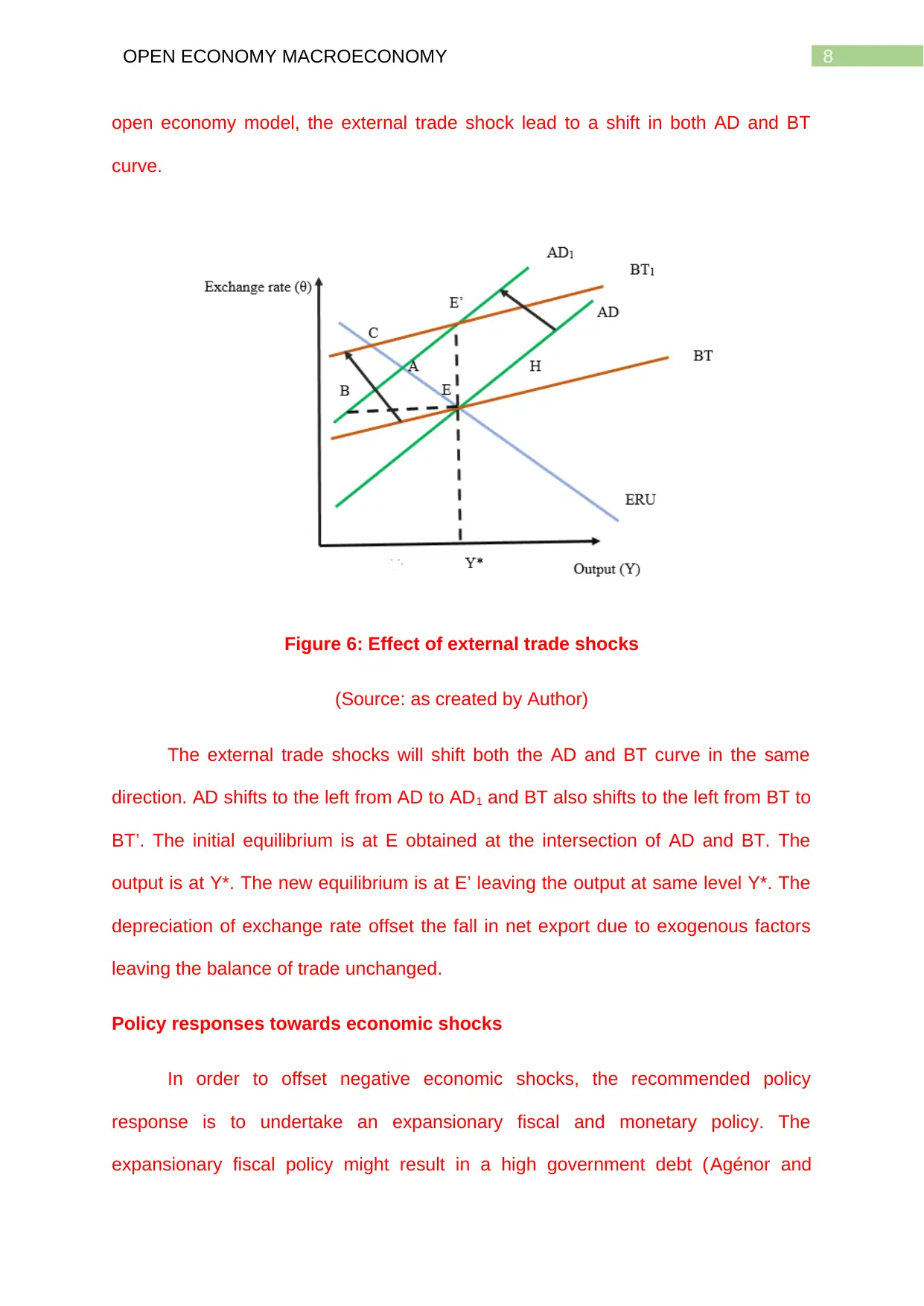
8OPEN ECONOMY MACROECONOMY
open economy model, the external trade shock lead to a shift in both AD and BT
curve.
Figure 6: Effect of external trade shocks
(Source: as created by Author)
The external trade shocks will shift both the AD and BT curve in the same
direction. AD shifts to the left from AD to AD1 and BT also shifts to the left from BT to
BT’. The initial equilibrium is at E obtained at the intersection of AD and BT. The
output is at Y*. The new equilibrium is at E’ leaving the output at same level Y*. The
depreciation of exchange rate offset the fall in net export due to exogenous factors
leaving the balance of trade unchanged.
Policy responses towards economic shocks
In order to offset negative economic shocks, the recommended policy
response is to undertake an expansionary fiscal and monetary policy. The
expansionary fiscal policy might result in a high government debt (Agénor and
open economy model, the external trade shock lead to a shift in both AD and BT
curve.
Figure 6: Effect of external trade shocks
(Source: as created by Author)
The external trade shocks will shift both the AD and BT curve in the same
direction. AD shifts to the left from AD to AD1 and BT also shifts to the left from BT to
BT’. The initial equilibrium is at E obtained at the intersection of AD and BT. The
output is at Y*. The new equilibrium is at E’ leaving the output at same level Y*. The
depreciation of exchange rate offset the fall in net export due to exogenous factors
leaving the balance of trade unchanged.
Policy responses towards economic shocks
In order to offset negative economic shocks, the recommended policy
response is to undertake an expansionary fiscal and monetary policy. The
expansionary fiscal policy might result in a high government debt (Agénor and
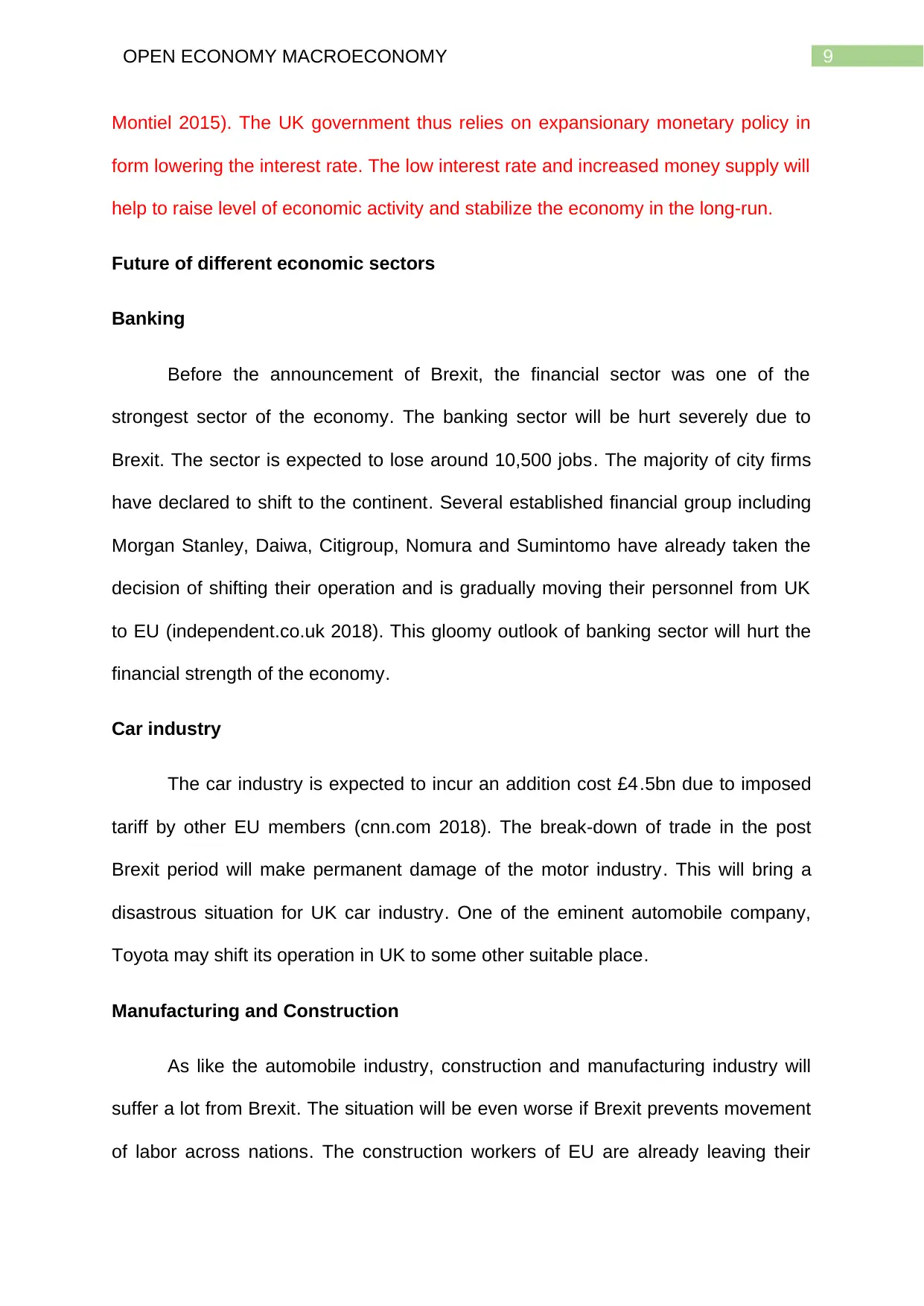
9OPEN ECONOMY MACROECONOMY
Montiel 2015). The UK government thus relies on expansionary monetary policy in
form lowering the interest rate. The low interest rate and increased money supply will
help to raise level of economic activity and stabilize the economy in the long-run.
Future of different economic sectors
Banking
Before the announcement of Brexit, the financial sector was one of the
strongest sector of the economy. The banking sector will be hurt severely due to
Brexit. The sector is expected to lose around 10,500 jobs. The majority of city firms
have declared to shift to the continent. Several established financial group including
Morgan Stanley, Daiwa, Citigroup, Nomura and Sumintomo have already taken the
decision of shifting their operation and is gradually moving their personnel from UK
to EU (independent.co.uk 2018). This gloomy outlook of banking sector will hurt the
financial strength of the economy.
Car industry
The car industry is expected to incur an addition cost £4.5bn due to imposed
tariff by other EU members (cnn.com 2018). The break-down of trade in the post
Brexit period will make permanent damage of the motor industry. This will bring a
disastrous situation for UK car industry. One of the eminent automobile company,
Toyota may shift its operation in UK to some other suitable place.
Manufacturing and Construction
As like the automobile industry, construction and manufacturing industry will
suffer a lot from Brexit. The situation will be even worse if Brexit prevents movement
of labor across nations. The construction workers of EU are already leaving their
Montiel 2015). The UK government thus relies on expansionary monetary policy in
form lowering the interest rate. The low interest rate and increased money supply will
help to raise level of economic activity and stabilize the economy in the long-run.
Future of different economic sectors
Banking
Before the announcement of Brexit, the financial sector was one of the
strongest sector of the economy. The banking sector will be hurt severely due to
Brexit. The sector is expected to lose around 10,500 jobs. The majority of city firms
have declared to shift to the continent. Several established financial group including
Morgan Stanley, Daiwa, Citigroup, Nomura and Sumintomo have already taken the
decision of shifting their operation and is gradually moving their personnel from UK
to EU (independent.co.uk 2018). This gloomy outlook of banking sector will hurt the
financial strength of the economy.
Car industry
The car industry is expected to incur an addition cost £4.5bn due to imposed
tariff by other EU members (cnn.com 2018). The break-down of trade in the post
Brexit period will make permanent damage of the motor industry. This will bring a
disastrous situation for UK car industry. One of the eminent automobile company,
Toyota may shift its operation in UK to some other suitable place.
Manufacturing and Construction
As like the automobile industry, construction and manufacturing industry will
suffer a lot from Brexit. The situation will be even worse if Brexit prevents movement
of labor across nations. The construction workers of EU are already leaving their
Secure Best Marks with AI Grader
Need help grading? Try our AI Grader for instant feedback on your assignments.
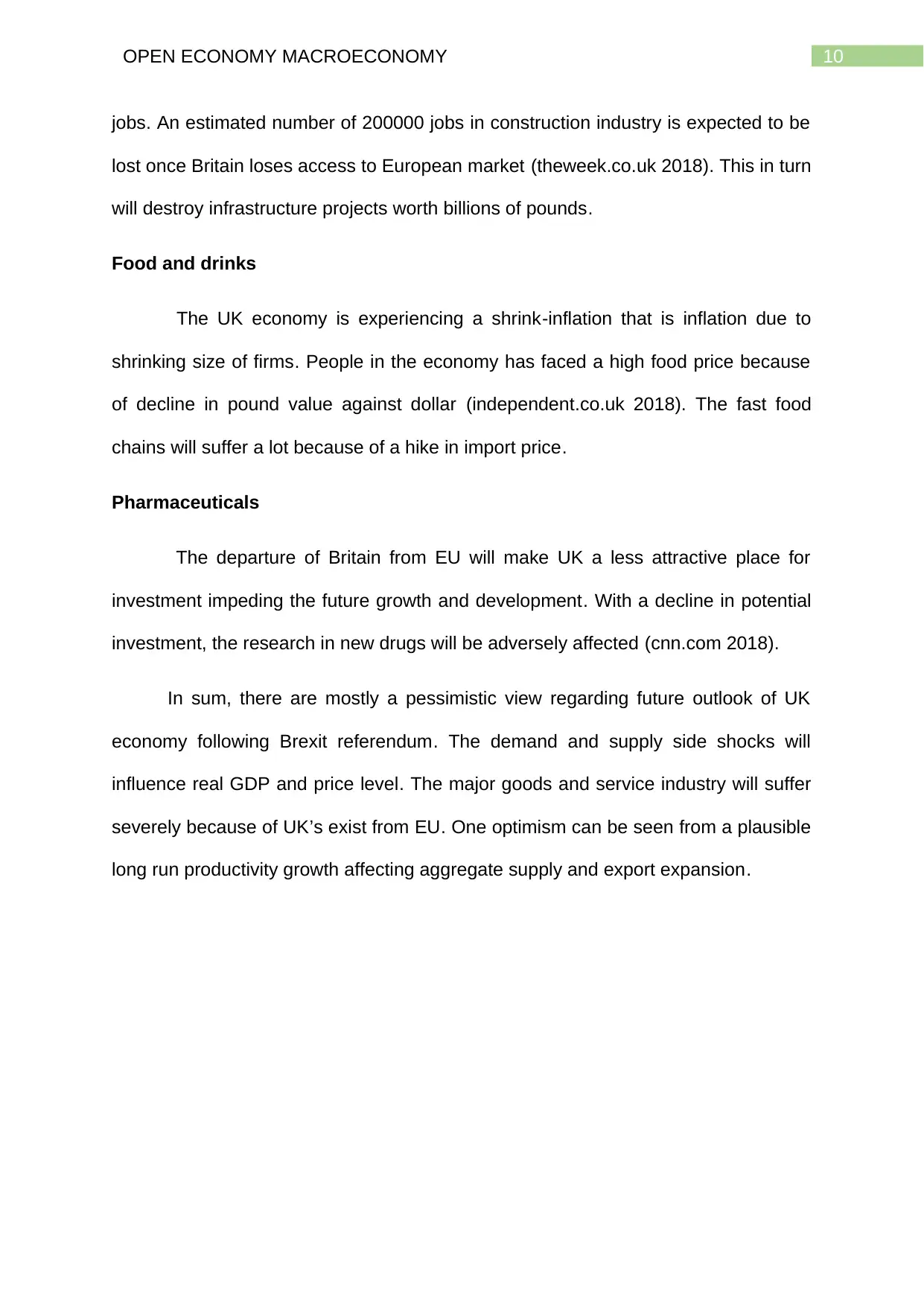
10OPEN ECONOMY MACROECONOMY
jobs. An estimated number of 200000 jobs in construction industry is expected to be
lost once Britain loses access to European market (theweek.co.uk 2018). This in turn
will destroy infrastructure projects worth billions of pounds.
Food and drinks
The UK economy is experiencing a shrink-inflation that is inflation due to
shrinking size of firms. People in the economy has faced a high food price because
of decline in pound value against dollar (independent.co.uk 2018). The fast food
chains will suffer a lot because of a hike in import price.
Pharmaceuticals
The departure of Britain from EU will make UK a less attractive place for
investment impeding the future growth and development. With a decline in potential
investment, the research in new drugs will be adversely affected (cnn.com 2018).
In sum, there are mostly a pessimistic view regarding future outlook of UK
economy following Brexit referendum. The demand and supply side shocks will
influence real GDP and price level. The major goods and service industry will suffer
severely because of UK’s exist from EU. One optimism can be seen from a plausible
long run productivity growth affecting aggregate supply and export expansion.
jobs. An estimated number of 200000 jobs in construction industry is expected to be
lost once Britain loses access to European market (theweek.co.uk 2018). This in turn
will destroy infrastructure projects worth billions of pounds.
Food and drinks
The UK economy is experiencing a shrink-inflation that is inflation due to
shrinking size of firms. People in the economy has faced a high food price because
of decline in pound value against dollar (independent.co.uk 2018). The fast food
chains will suffer a lot because of a hike in import price.
Pharmaceuticals
The departure of Britain from EU will make UK a less attractive place for
investment impeding the future growth and development. With a decline in potential
investment, the research in new drugs will be adversely affected (cnn.com 2018).
In sum, there are mostly a pessimistic view regarding future outlook of UK
economy following Brexit referendum. The demand and supply side shocks will
influence real GDP and price level. The major goods and service industry will suffer
severely because of UK’s exist from EU. One optimism can be seen from a plausible
long run productivity growth affecting aggregate supply and export expansion.
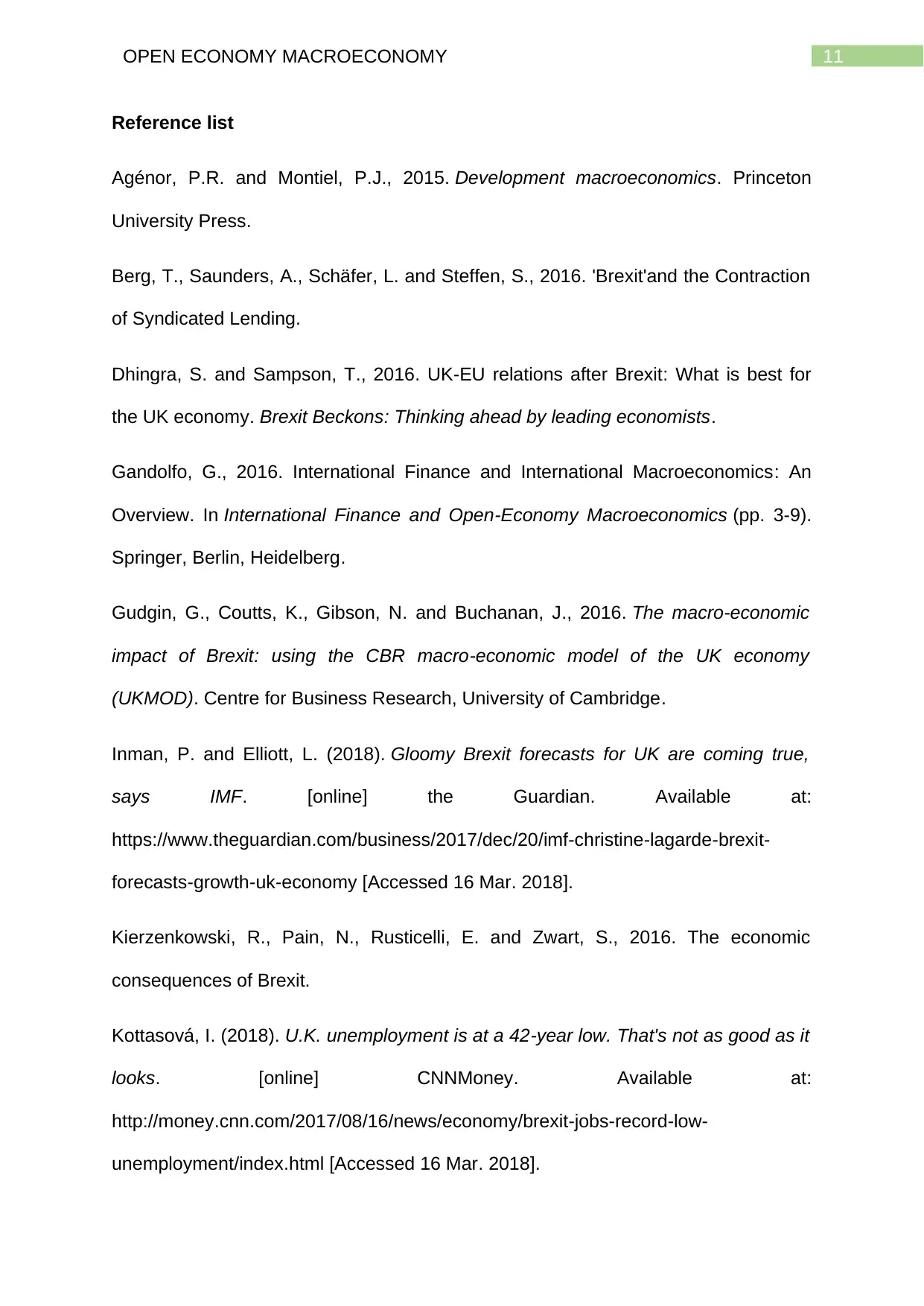
11OPEN ECONOMY MACROECONOMY
Reference list
Agénor, P.R. and Montiel, P.J., 2015. Development macroeconomics. Princeton
University Press.
Berg, T., Saunders, A., Schäfer, L. and Steffen, S., 2016. 'Brexit'and the Contraction
of Syndicated Lending.
Dhingra, S. and Sampson, T., 2016. UK-EU relations after Brexit: What is best for
the UK economy. Brexit Beckons: Thinking ahead by leading economists.
Gandolfo, G., 2016. International Finance and International Macroeconomics: An
Overview. In International Finance and Open-Economy Macroeconomics (pp. 3-9).
Springer, Berlin, Heidelberg.
Gudgin, G., Coutts, K., Gibson, N. and Buchanan, J., 2016. The macro-economic
impact of Brexit: using the CBR macro-economic model of the UK economy
(UKMOD). Centre for Business Research, University of Cambridge.
Inman, P. and Elliott, L. (2018). Gloomy Brexit forecasts for UK are coming true,
says IMF. [online] the Guardian. Available at:
https://www.theguardian.com/business/2017/dec/20/imf-christine-lagarde-brexit-
forecasts-growth-uk-economy [Accessed 16 Mar. 2018].
Kierzenkowski, R., Pain, N., Rusticelli, E. and Zwart, S., 2016. The economic
consequences of Brexit.
Kottasová, I. (2018). U.K. unemployment is at a 42-year low. That's not as good as it
looks. [online] CNNMoney. Available at:
http://money.cnn.com/2017/08/16/news/economy/brexit-jobs-record-low-
unemployment/index.html [Accessed 16 Mar. 2018].
Reference list
Agénor, P.R. and Montiel, P.J., 2015. Development macroeconomics. Princeton
University Press.
Berg, T., Saunders, A., Schäfer, L. and Steffen, S., 2016. 'Brexit'and the Contraction
of Syndicated Lending.
Dhingra, S. and Sampson, T., 2016. UK-EU relations after Brexit: What is best for
the UK economy. Brexit Beckons: Thinking ahead by leading economists.
Gandolfo, G., 2016. International Finance and International Macroeconomics: An
Overview. In International Finance and Open-Economy Macroeconomics (pp. 3-9).
Springer, Berlin, Heidelberg.
Gudgin, G., Coutts, K., Gibson, N. and Buchanan, J., 2016. The macro-economic
impact of Brexit: using the CBR macro-economic model of the UK economy
(UKMOD). Centre for Business Research, University of Cambridge.
Inman, P. and Elliott, L. (2018). Gloomy Brexit forecasts for UK are coming true,
says IMF. [online] the Guardian. Available at:
https://www.theguardian.com/business/2017/dec/20/imf-christine-lagarde-brexit-
forecasts-growth-uk-economy [Accessed 16 Mar. 2018].
Kierzenkowski, R., Pain, N., Rusticelli, E. and Zwart, S., 2016. The economic
consequences of Brexit.
Kottasová, I. (2018). U.K. unemployment is at a 42-year low. That's not as good as it
looks. [online] CNNMoney. Available at:
http://money.cnn.com/2017/08/16/news/economy/brexit-jobs-record-low-
unemployment/index.html [Accessed 16 Mar. 2018].
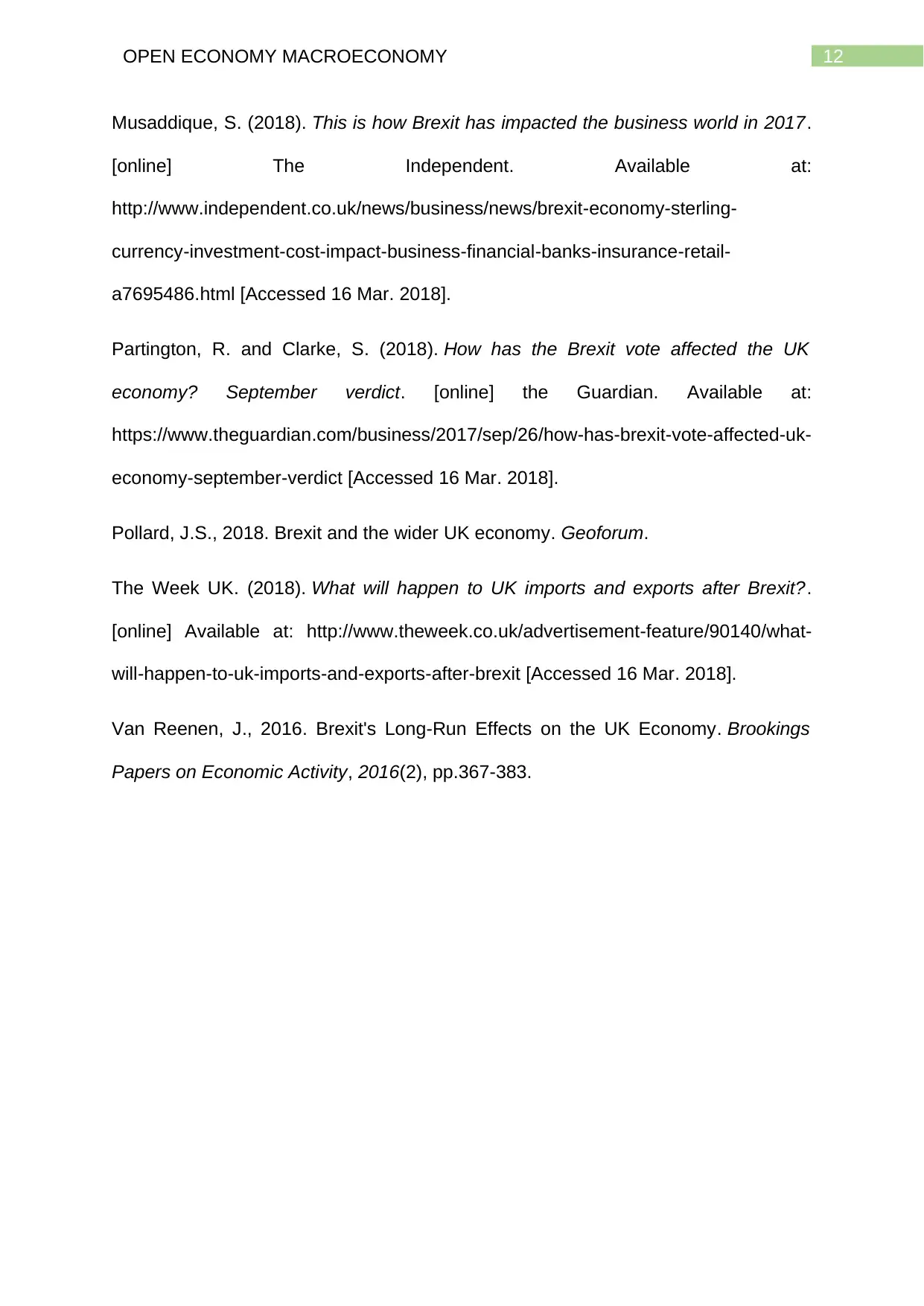
12OPEN ECONOMY MACROECONOMY
Musaddique, S. (2018). This is how Brexit has impacted the business world in 2017.
[online] The Independent. Available at:
http://www.independent.co.uk/news/business/news/brexit-economy-sterling-
currency-investment-cost-impact-business-financial-banks-insurance-retail-
a7695486.html [Accessed 16 Mar. 2018].
Partington, R. and Clarke, S. (2018). How has the Brexit vote affected the UK
economy? September verdict. [online] the Guardian. Available at:
https://www.theguardian.com/business/2017/sep/26/how-has-brexit-vote-affected-uk-
economy-september-verdict [Accessed 16 Mar. 2018].
Pollard, J.S., 2018. Brexit and the wider UK economy. Geoforum.
The Week UK. (2018). What will happen to UK imports and exports after Brexit?.
[online] Available at: http://www.theweek.co.uk/advertisement-feature/90140/what-
will-happen-to-uk-imports-and-exports-after-brexit [Accessed 16 Mar. 2018].
Van Reenen, J., 2016. Brexit's Long-Run Effects on the UK Economy. Brookings
Papers on Economic Activity, 2016(2), pp.367-383.
Musaddique, S. (2018). This is how Brexit has impacted the business world in 2017.
[online] The Independent. Available at:
http://www.independent.co.uk/news/business/news/brexit-economy-sterling-
currency-investment-cost-impact-business-financial-banks-insurance-retail-
a7695486.html [Accessed 16 Mar. 2018].
Partington, R. and Clarke, S. (2018). How has the Brexit vote affected the UK
economy? September verdict. [online] the Guardian. Available at:
https://www.theguardian.com/business/2017/sep/26/how-has-brexit-vote-affected-uk-
economy-september-verdict [Accessed 16 Mar. 2018].
Pollard, J.S., 2018. Brexit and the wider UK economy. Geoforum.
The Week UK. (2018). What will happen to UK imports and exports after Brexit?.
[online] Available at: http://www.theweek.co.uk/advertisement-feature/90140/what-
will-happen-to-uk-imports-and-exports-after-brexit [Accessed 16 Mar. 2018].
Van Reenen, J., 2016. Brexit's Long-Run Effects on the UK Economy. Brookings
Papers on Economic Activity, 2016(2), pp.367-383.
1 out of 13
Related Documents
Your All-in-One AI-Powered Toolkit for Academic Success.
+13062052269
info@desklib.com
Available 24*7 on WhatsApp / Email
![[object Object]](/_next/static/media/star-bottom.7253800d.svg)
Unlock your academic potential
© 2024 | Zucol Services PVT LTD | All rights reserved.





